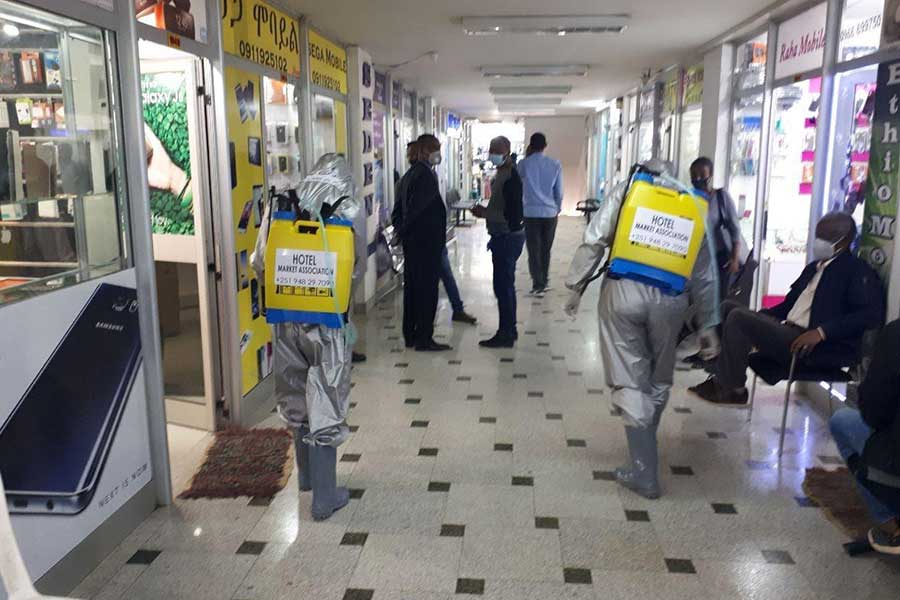
Radar | Jun 17,2023
Aug 30 , 2025
By BEZAWIT HULUAGER ( FORTUNE STAFF WRITER )
Nearly half a million traders are now feeling the heat as inspectors step up efforts to enforce compliance. Recent figures from the Ministry of Trade & Regional Integration (MTRI) reveal that 285,323 traders received notices, 171,095 were closed or sealed, and 2,965 saw their licenses revoked, numbers that mark one of the largest crackdowns on the private sector in recent years.
The private sector is under unprecedented scrutiny as federal trade officials launch one of its most extensive enforcement drives in recent memory. Framed as a response to rampant non-compliance, the crackdown has already swept up nearly half a million businesses across the country, igniting concerns among businesses, economists, and business associations.
A recent announcement by officials of the Ministry of Trade & Regional Integration (MTRI), under Kassahun Gofe, revealed that approximately one in every six traders was found to be breaking rules, with more than 480,000 businesses facing administrative and legal penalties. The moves mark a fresh effort by the government to impose order in a market often beset by shifting regulations, rising costs, and falling consumer demand.
The Ministry’s findings were made public at the Ethiopian Quality Award Organisation’s “Quality Village,” a symbolic backdrop on Megenagna Ring Road, where the new data revealed both the scale of the problem and the authorities' desire to be seen acting decisively. The Ministry's inspectors claim that 15pc of registered businesses were not following the rules after recent inspections. Penalties ranged from warnings to outright licence cancellations.
In total, 285,323 businesses received forewarning letters, 171,095 were closed and sealed, while 2,965 lost their trade licences altogether.
The capital serves as a case in point for the current turbulence in the trading environment. In the city, officials cancelled almost 30pc of the licences in circulation. While more than 99,000 new licences were issued in the past year, over 37,000 were cancelled, evident signs of an unstable and fast-changing retail environment. Contraband remains a serious concern for trade officials in Addis Abeba, especially around essentials like cooking oil and fuel.
During the recent crackdown, authorities reported recovering 8.6 million Br worth of contraband goods. Enforcement officers also claim to have found more than 36,000 businesses trading illegally, with nearly half of them failing to renew their licences.
The realities behind these numbers come into focus in stories like that of Kalkidan Feleke, a young businesswoman who started selling shirts, tote bags and trousers online a year ago. Digital platforms like TikTok and Telegram offered her an affordable way to break into the business, but she soon realised customers still want to see products in person.
“I rented a shelf for 2,000 Br in a shop," she told Fortune. "That way, I avoid the burden I might face at the early stage of the business.”
For Kalkidan, the costs of going fully legal are still out of reach. Near Megenagna, a small space she wanted to rent was 30,000 Br a month.
“Given that the nature of my business is not daily consumption, I prefer to collect capital gradually before considering a full shop," said Kalkidan. "It's been five months since I rented a shelf for display.”
VAT, taxes and soaring rental prices make it nearly impossible for small traders like her to go fully above board from day one.
However, business leaders say the challenges extend beyond simply complying with the law.
According to Sebsib Abafira, president of the Ethiopian Chamber of Commerce & Sectoral Association, the authorities should build awareness before stepping up enforcement. The Chamber, he said, does not defend those engaged in illicit activities, and is working to train auditors and accountants about the new tax rules. But he is also critical of the pace of reforms.
“The traders have less knowledge about how tax works,” Sebsib told Fortune. “Our role is to create awareness and provide training for our members.”
The pressure on traders is felt across the country. In Dire Dawa, local authorities found nearly 28,000 traders that allegedly failed to renew their licences, and seized expired goods worth over 300,000 Br. The illicit sale of fuel generated 19.4 million Br for the region, while confiscated goods in Dire Dawa were valued at 1.6 billion Br, by far the highest of any regional state. Local businesses that broke the rules were penalised half a billion Birr.
Aminu Teha, head of the city’s Trade, Industry & Investment Bureau, raised concerns about traders using railway lines to transport coffee for export, a practice currently allowed only for livestock. According to Aminu, such loopholes can undercut local regulations.
Elsewhere, the Southern region reported penalties totalling 19.5 million Br, mostly tied to the illicit fuel trade. Nearly nine million Birr in revenue was raised from these cases, and regional officials confiscated goods worth 21.9 million Br. Out of approximately 133,000 registered traders, 14pc were allegedly caught engaging in illegal activities, resulting in fines totalling 53.1 million Br. In the Amhara Regional State, illicit trade remains a major headache for the local authority.
Fetenaw Fetene, head of the regional Trade Bureau, blamed recurrent security problems for making it difficult to keep a lid on crime and illegal trading.
“Traders attempting to inflate prices beyond officially set levels had also faced penalties,” he said.
Fetenaw admitted the Bureau struggled to monitor businesses in 2023 due to instability, with 15,000 licences cancelled and 109,000 penalised, about a third for operating without proper paperwork. The Bureau raised 24.1 million Br from expired goods and 85.6 million Br in penalties, not counting cases involving fuel. Authorities plan to establish seven new trade houses, with a budget of half a billion Birr, and encourage more direct sales between farmers and consumers to reduce illicit trade.
At the national level, penalties for illicit trading reached almost two billion Birr. The federal government itself penalised 110,000 traders, confiscated nearly 1.2 million litres of fuel for sale on the parallel market and resold it for 118 million Br, in addition to collecting 40 million Br in fines. However, these measures have not alleviated the deeper financial strains. Officials admitted that unpaid dues from fuel subsidies have now reached 201.6 billion Br. Although federal authorities had planned to slash subsidies by 94pc last year, a sharp drop in the currency forced them to backtrack, and costs ended up tripling.
For many retailers, the strain is proving too much.
According to Sani Tuki, an investment consultant and international trade adviser, frequent policy shifts and high taxes have driven many traders into a state of survival.
“Importing is still insufficient,” he noted, pointing out that minimum export prices set by the Ministry have driven up domestic costs and cut profits, especially in industries like leather. “They stay inactive until demand recovers.”
Sani argued that unpredictable policies, bureaucratic delays and inflation have squeezed businesses on all sides. He called for more careful engagement with traders before introducing new rules, and recommended boosting export and farm subsidies.
“Exporters should retain up to 70pc of their foreign exchange earnings, rather than the current 50pc,” he said.
PUBLISHED ON
Aug 30,2025 [ VOL
26 , NO
1322]

Radar | Jun 17,2023

Featured | Sep 06,2020

Commentaries | Nov 18,2023

Radar | Aug 11,2024

Featured | Jul 25,2020

Dec 22 , 2024 . By TIZITA SHEWAFERAW
Charged with transforming colossal state-owned enterprises into modern and competitiv...

Aug 18 , 2024 . By AKSAH ITALO
Although predictable Yonas Zerihun's job in the ride-hailing service is not immune to...

Jul 28 , 2024 . By TIZITA SHEWAFERAW
Unhabitual, perhaps too many, Samuel Gebreyohannes, 38, used to occasionally enjoy a couple of beers at breakfast. However, he recently swit...

Jul 13 , 2024 . By AKSAH ITALO
Investors who rely on tractors, trucks, and field vehicles for commuting, transporting commodities, and f...

Oct 25 , 2025
The regulatory machinery is on overdrive. In only two years, no fewer than 35 new pro...

Oct 18 , 2025
The political establishment, notably the ruling party and its top brass, has become p...

Oct 11 , 2025
Ladislas Farago, a roving Associated Press (AP) correspondent, arrived in Ethiopia in...

Oct 4 , 2025
Eyob Tekalegn (PhD) had been in the Governor's chair for only weeks when, on Septembe...